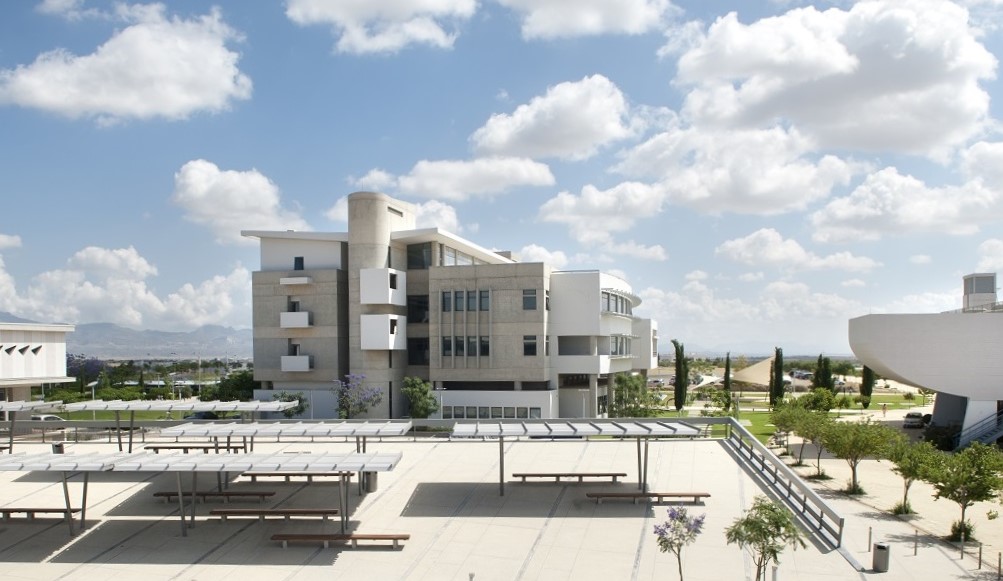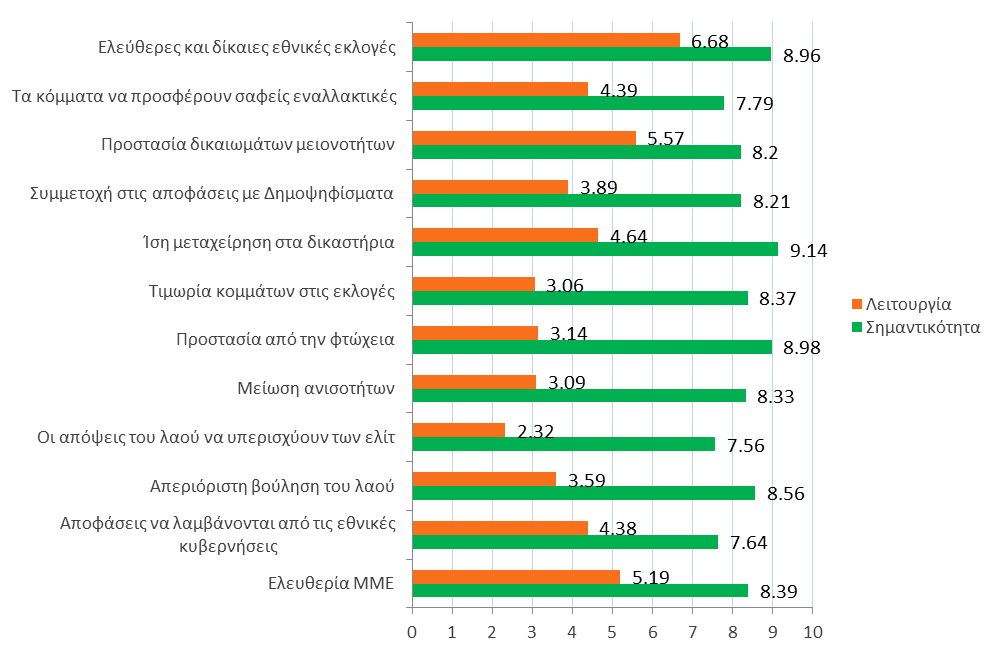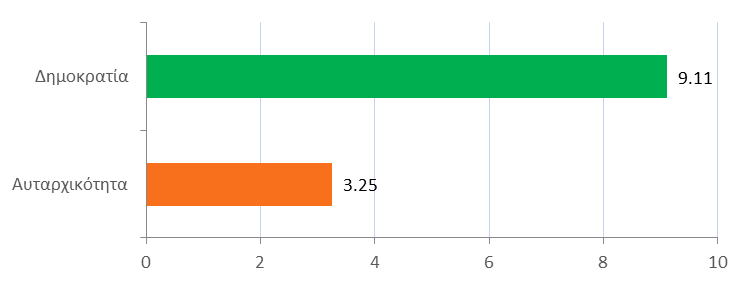
University Centre for Field Research, Dr. Haris Psaltis
Historically, it has been questioned from time to time whether democracy is the ideal form of constitution or whether it is simply one of the alternative forms of government. On the opposite side of democracy, where the power of leadership comes from the people, stand authoritarian/dictatorial regimes where power and authority are concentrated in the leadership which exercises absolute control over the citizens.
Drawing on the dissatisfaction of citizens with the inadequate management of contemporary European crises (e.g. economic crisis, migrant and refugee phenomenon, Covid-19 pandemic), populist and radical right parties are gaining strength. These new parties are gaining momentum that could be aimed against the established parties and reshape the political scene, influencing both expectations and citizens’ assessments of democracy and its functioning.
Given that citizens’ attitudes are the most important factor in ensuring the resilience of democracy in times of pressure, it is absolutely crucial to see whether or not citizens’ assessments of democracy have changed. The European Commission, noting the variation in citizens’ preferences regarding the dimensions of democracy, ‘divides’ democracy into components corresponding to five models: the Liberal, Social Democratic, Direct Democracy, Populist and Multilevel models. By asking questions related to each of the above models, the Commission first assesses how important each component of democracy is deemed to be and then how well it works in the country. This measurement, of course, relates to the subjective perceptions of the citizens themselves.
The most important dimension for Greek Cypriot citizens in terms of assessing the importance of the dimensions of democracy is the dimension of the rule of law which corresponds to the Liberal model of democracy. The question ‘The courts should treat everyone equally’ receives the highest average score (9.14). The second most important dimension for democracy is the dimension of equality which belongs to the Social Democracy model. The corresponding question ‘The government protects citizens from poverty’ registers an average of 8.98. The lowest average is recorded for the anti-elitist dimension of the Populist model with the question ‘The views of ordinary people override those of the elite’ recording an average of 7.56, an average which is of course quite high in absolute terms.
In terms of measuring citizens’ assessments of how well these dimensions of democracy work, the dimension that is considered to work best in Cyprus is the dimension of competition, which belongs to the liberal model of democracy, with the question ‘National elections in Cyprus are free and fair’ recording the highest average (6.68). The lowest mean was again recorded by the dimension of anti-elitism of the Populist model with the question ‘In Cyprus, the views of ordinary citizens override the views of the political elite’ recording the lowest mean (2.32).

Comparison of the importance and functioning of the dimensions of democracy in Cyprus
In our country there is a very big gap between the importance of democratic principles for citizens and how they believe they are implemented in their daily lives. This gap appears to be more extensive for citizens’ assessments of party accountability. While the importance of punishing government parties in elections for not doing their job properly is rated very highly, the way this is actually manifested in Cyprus today is rated as unsatisfactory. A similar phenomenon can be observed with regard to the question ‘the views of citizens override those of the political elite’ and for the question ‘the government protects all citizens from poverty’. The gap between the importance of democracy and the satisfaction of the Cypriot citizen should be a matter of concern for those responsible for the areas where democracy is considered to be lacking.
This gap is also revealed when participants are asked about the importance and functioning of democracy as a whole. The importance of democratic governance receives a very high rating from the participants and scores an average of 9.11. In contrast, the question concerning the satisfaction of people with the way democracy works in Cyprus registers a much lower average of 4.17. Even more problematic is the change in importance and satisfaction with democracy over time. In detail, while in Europe as a whole there does not seem to be much change since 2012, in Cyprus the story is different. From 2012 to 2020 in Cyprus satisfaction with democracy drops significantly. What is worrying is that along with satisfaction, the importance attached to democracy seems to fall even further below 2012 levels, to a lesser but significant extent.

Comparison of the importance and functioning of democracy as a whole in Cyprus

Assessment of the functioning of democracy in Cyprus as a whole over time
In 2020, the importance of democracy remains high for most Cypriot citizens who would not change democratic governance with an authoritarian regime, but on the other hand, a not insignificant percentage of them do not condemn the authoritarian way of governance. In particular, about three out of ten agree to a greater or lesser extent that it is acceptable to have a leader above the law. Whether this share of preference for autocracy remains in the political arena remains to be seen through the next rounds of the Commission. Of course, it is worth noting that in Cyprus, loyalty to a leader has a lower approval rating than the average European, a reassuring finding.

Comparison of the importance of democratic governance and authoritarian regime.
Next, participants were asked about the responsiveness of the government, i.e. its ability to satisfy the governed by executing government policies in a way that meets the demands of the public. Specifically, most participants (88.6%) stated that the government should change its policies to align with public opinion. Again, there is a gap between what most citizens want and what they perceive to be actually happening in their country, as the majority said that change in government policies is rarely seen. On the other hand, in Cyprus, the portion that believes that it is better for democracy if the government sticks to its decisions regardless of public opinion, believes that this happens quite often in our country. Here we observe an agreement between those who choose that the government should change and the rest who think that it should persist: both parts of the population think that the government usually persists in its policies, i.e. does not change them often, regardless of public opinion. This perception manifests a democratic deficit, since citizens believe that public opinion is not listened to (good for a minority but bad for the majority).
According to further analyses, people with higher levels of education are more likely to attach greater importance to democracy but less likely to support an authoritarian leader. Greater satisfaction with the functioning of democracy in Cyprus is expressed by older people, people with a higher degree of religiosity and people living in rural areas. In addition, people with higher income are more likely to attach greater importance to democracy, while people with lower income are more likely to support an authoritarian leader. Finally, participants positioned on the right of the political scale attributed greater importance to democracy but also recorded higher satisfaction with its functioning in Cyprus.
Democracy in Cyprus remains a fundamental principle, which most citizens would not change. However, however much the importance of democratic governance is taken for granted, its realisation in our country seems to be anything but a given for its citizens, highlighting serious democratic deficits. Democracy, therefore, requires constant vigilance to ensure that the state apparatus responds corrective to the will of public opinion when there is a discrepancy between expectations and reality. After all, the very essence of democracy lies precisely in the election of representatives of public opinion. In order to keep democracy on the path that citizens want, large-scale social surveys, such as the Commission, are necessary to ensure that the state apparatus is in sync with the trend of civil society.







Leave A Comment